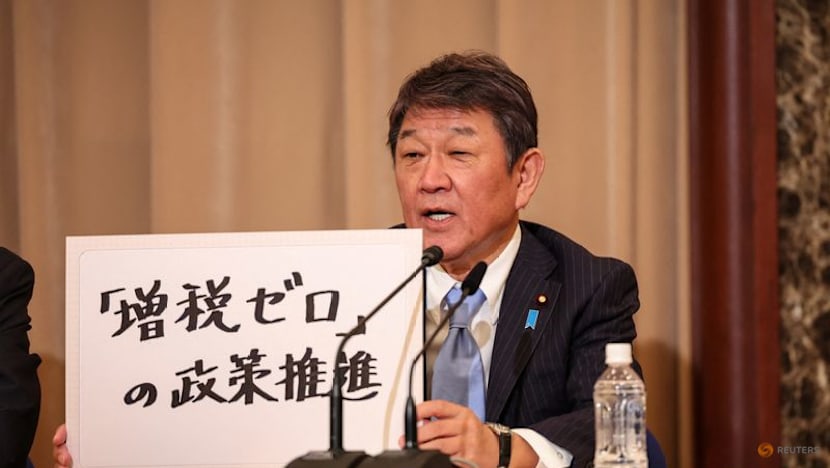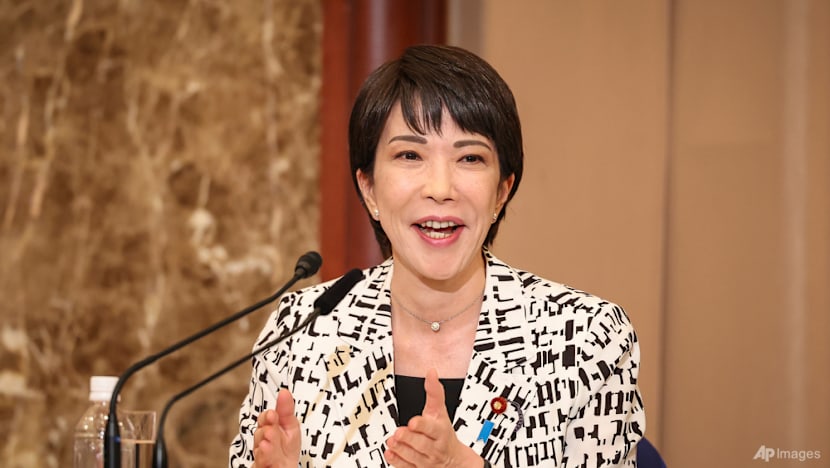Japanese lawmakers launch leadership bids after PM resigns, yen sinks

Liberal Democratic Party (LDP) secretary general Toshimitsu Motegi holds up a sign during a debate at the Nixon Kisha Club in Tokyo, Japan. Motegi became the first LDP lawmaker on Sep 8, 2025, to enter the race to replace outgoing Prime Minister Shigeru Ishiba. (File photo: Pool via Reuters)
TOKYO: Former foreign minister Toshimitsu Motegi became the first ruling party lawmaker on Monday (Sep 8) to throw his hat into the ring to succeed outgoing Japanese Prime Minister Shigeru Ishiba, as financial markets whipsawed on the political uncertainty.
Ishiba called time on his brief tenure on Sunday, saying he was taking responsibility for bruising elections that saw his ruling coalition lose its majority in both houses of parliament amid voter anger over rising living costs.
He instructed his Liberal Democratic Party (LDP) - which has governed Japan for most of its post-war history - to hold an emergency leadership election. The party plans to hold the vote on Oct 4, an LDP official close to the matter told Reuters.
Japan's yen currency sank and stocks surged on Monday after Ishiba's resignation stoked speculation that his potential successors - such as fiscal dove Sanae Takaichi - may ramp up spending in the world's most indebted advanced economy.
"The LDP is facing its worst crisis since its founding," Motegi, 69, told reporters on Monday as he announced his plan to stand for leadership.
"We must unite quickly to tackle our serious challenges at home and abroad and move the country forward."
With strong English, the Harvard-educated politician was dubbed the "Trump whisperer" for his deft handling of tricky United States-Japan trade talks.
He is among the clutch of contenders likely to emerge in the coming days. Other hopefuls include Yoshimasa Hayashi, Ishiba's top government spokesman, and Takayuki Kobayashi, former economic security minister.
The frontrunners, however, are LDP veteran Takaichi and Shinjiro Koizumi, a political scion and son of former prime minister Junichiro Koizumi, who gained prominence as Ishiba's farm minister tasked with trying to rein in soaring rice prices.
Both would mark milestones for Japan: Takaichi, 64, becoming its first female leader and Koizumi, 44, its youngest in the modern era.
Neither has formally announced their candidacy, but they finished second and third, respectively, in the last leadership contest in September 2024.
"All indications are that it will come down to them facing off against each other," said Jeffrey Hall, a lecturer in Japanese studies at Kanda University of International Studies.
CONSERVATIVE CONTENDER
Of most consequence for investors and Japan's diplomatic relations would be Takaichi, who has held a number of posts, including as economic security and internal affairs ministers.
She stands out for her opposition to the Bank of Japan's (BOJ) interest rate hikes and her calls to ramp up spending to boost the fragile economy.
Investors are betting the political hiatus alone will delay the BOJ's monetary policy tightening plans. Money markets are now pricing in a roughly 20 per cent chance of the BOJ hiking rates by the end of October, down from 46 per cent a week ago.
The expected leadership bid of the nationalistic Takaichi will also be closely watched by Japan's powerful neighbour China.
Known for conservative positions such as revising the pacifist postwar constitution, Takaichi is a regular visitor to the Yasukuni shrine to honour Japan's war dead, viewed by Beijing and others as a symbol of past militarism.
Takaichi earlier this year also visited Taiwan, the democratic island claimed by China, where she suggested Taiwan, Japan and other partners could form a "quasi-security alliance".
"China might take a more hostile stance towards Japan, because she depicts herself as very much a hawk regarding China," said Hall of Kanda University.

AGEING POPULATION, NATIONAL DEBT
The LDP will discuss when and how to elect its new president this week, a party official told AFP, but the new leader will still need approval from both chambers of parliament to become Japan's prime minister.
There's a slim chance that the LDP president could lose the vote, with the ruling coalition -made up of the LDP and the Komeito party - a minority in both houses of parliament.
"The LDP needs to find someone who can unite the party, appeal to the public, but also someone who can gain support from other parties," Kensuke Takayasu, a politics professor at Waseda University, told AFP.
Any new leader will have a host of complex issues to tackle, including a rapidly ageing population, colossal national debt and an economy teetering on the brink of recession as inflation pinches consumers.
Despite a new trade deal with President Donald Trump, Japanese imports still face tariffs of 15 per cent and Tokyo has promised US$550 billion of investments into the US economy.
The close US strategic ally is also under pressure to further hike defence spending and be more muscular in the case of confrontation with China over Taiwan.
















